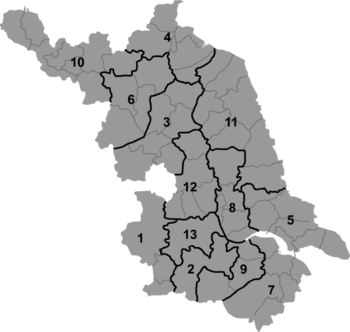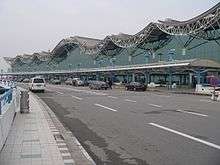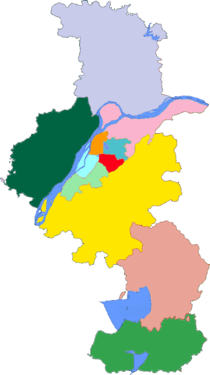Nanjing Lukou International Airport
| Nanjing Lukou International Airport 南京禄口国际机场 Nánjīng Lùkǒu Guójì Jīchǎng | |||||||||||||||
|---|---|---|---|---|---|---|---|---|---|---|---|---|---|---|---|
|
Interior of Terminal 1, which is now closed for renovation | |||||||||||||||
| IATA: NKG – ICAO: ZSNJ | |||||||||||||||
| Summary | |||||||||||||||
| Airport type | Public | ||||||||||||||
| Serves | Nanjing, Jiangsu | ||||||||||||||
| Location | Lukou, Jiangning District | ||||||||||||||
| Hub for | |||||||||||||||
| Focus city for | |||||||||||||||
| Elevation AMSL | 15 m / 49 ft | ||||||||||||||
| Coordinates | 31°44′32″N 118°51′43″E / 31.74222°N 118.86194°ECoordinates: 31°44′32″N 118°51′43″E / 31.74222°N 118.86194°E | ||||||||||||||
| Map | |||||||||||||||
 NKG Location of airport in Jiangsu | |||||||||||||||
| Runways | |||||||||||||||
| |||||||||||||||
| Statistics (2015) | |||||||||||||||
| |||||||||||||||
| Nanjing Lukou International Airport | |||||||
| Traditional Chinese | 南京祿口國際機場 | ||||||
|---|---|---|---|---|---|---|---|
| Simplified Chinese | 南京禄口国际机场 | ||||||
| |||||||
Nanjing Lukou International Airport (IATA: NKG, ICAO: ZSNJ) is the main airport serving Nanjing (the capital of China's Jiangsu Province) and a major airport serving the Yangtze River Delta area. It is located in the suburban Jiangning District, over 35 km south of the city center, and is connected to Nanjing and neighboring towns by expressways. Phase I of the Ninggao Intercity Line and Line S1 of the Nanjing Metro link the airport with Nanjing South Railway Station.
Nanjing is the hub for China Eastern Airlines' Jiangsu Company, and a focus city for Shenzhen Airlines. China Southern Airlines and Xiamen Airlines also operate a considerable number of flights there. Nanjing is the main base for China Postal Airlines, with pure cargo service to all major cities in China, handling express mail and cargo transportation for China Post. In 2013, the airport handled 15,011,792 passengers and 255,788.6 tonnes of freight.[1]
History
Construction of Nanjing Lukou International Airport started on February 28, 1995, and was completed two years later. When the airport opened on July 1, 1997, all civilian operations were transferred to it from Nanjing Dajiaochang Airport, and Nanjing Dajiaochang was converted to a Chinese military air base.
Although Nanjing Lukou had been designated an international airport since commencing operations, China’s state administrations only approved it for foreign aircraft on November 18, 1997.
In 2006, China Post started building its express logistics center at Nanjing Lukou to handle its express mail services. Initial construction was completed by 2009, with additional facilities and functions added continuously. The final project, as planned, would be the largest in Asia and the third-largest in the world of its kind.[2]
In 2009, the airport handled 10 million passengers.[3] In 2013, that number surpassed 15 million, which was 3 million above the terminal’s designed operational capacity. In preparation for the 2014 Summer Youth Olympics, hosted by Nanjing, Terminal 2 was completed after more than three years of construction. Also completed were a new parallel runway with taxiways, a new tower, new aircraft parking positions, and new cargo handling facilities. On July 12, 2014, all flights were relocated to Terminal 2, and Terminal 1 was closed for renovation.[4]
The new facilities removed the bottleneck caused by the limited capability of the old terminal and runway. In November 2014, with the launching of the Phase 2 expansion and optimization of neighboring air traffic patterns, authorities approved an increase of peak-hour flight volume from 28 flights per hour to 38 flights per hour.[5]
With the added capacity, Nanjing Airport has seen rapid increase in both aircraft movement and total passengers. In 2015, the number of total passengers exceeded 19 million (until Dec 28), that is 2.87 million on top of 2014, a 17.7% increase compared to the same period of the previous year.[6] The airport continues to see substantial increase into 2016, which saw 29,210 aircraft movements and 3.39 million passengers handled in January and February, a 16.9% and a 21.2% increase respectively, comparing to the same period 2015.[7]
Composition

The airport consists of two terminals, two 3600-meter runways (paralleled by three taxiways and connected by two taxiways), two control towers, a cargo center, a transportation center, and an apron. Adjacent to, but not belonging to, the airport is the China Post express logistics center and the base for China Postal Airlines.
The older section of the airport consists of:
- Terminal 1 (floor space 132,000m², 16 boarding bridges, annual capacity 12 million passengers)
- one northern runway (length 3600 m, width 60 m, 4E rating)
- one taxiway (length 3600 m, width 45 m)
- a cargo center (34,000m²)
- an apron (447,000m²)
- a control tower (height 87 m[8])
Terminal 1 is currently closed for renovation. All passenger flights are handled by Terminal 2.
The Phase 2 expansion includes:[9]
- Terminal 2 (263,000m² floor space, 35 boarding bridges, annual capacity 18 million passengers)
- a new 4F-rating southern runway and two parallel taxiways
- two taxiways connecting the northern and southern runways
- 20 aircraft parking positions
- a second control tower (height 107 m[8])
- an 11,000m² carpark
- a transportation center, which seats a subway station, a coach station, a Pullman Hotel,[10] and shopping and dining facilities
The two terminals are also connected by the transportation center structure.
Airlines and destinations
Passenger
Cargo
Ground transportation
Airport shuttle[26]
City to airport
- From Nanjing South Railway Station: 6:00–21:00, every 20 minutes, duration 40 minutes.
- From Nanjing Railway Station East Square (with a stop at 221 Middle Longpan Road): 5:40–21:00, every 20 minutes, duration 80 minutes.
Airport to city
- Line 1: 30 minutes after the first landing to the last landing of the day (stops: Yuhua Square, Qinhong Bridge, Xihuamen, Nanjing Railway Station); max. interval 30 minutes.
- Line 2: 9:30–22:30 (stops: Cuipingshan Hotel, Nanjing South Railway Station, Zhonghuamen Subway Station), max. interval 30 minutes.
Expressway
The airport is accessed by Konggang Road, which connects to the Airport Expressway. The Airport Expressway is part of S55 Ningxuan (Nanjing-Xuancheng) Expressway.
Rail
The Lukou Airport Station on Phase I of the Ninggao Intercity Rail Line (also known as Line S1 of the Nanjing Metro) link the airport with Nanjing South Railway Station. Operation hours are from 6 AM (from Nanjing South Railway Station) or 6:40 AM (from the airport) to 10 PM, at 9'57" intervals in peak hours and 13'16" intervals in low hours. The entire journey takes approximately 35 minutes and costs 6 RMB.[27] At Nanjing South Railway Station, passengers can transfer to high-speed trains to other cities, coach services to nearby towns, and Nanjing subway and bus lines.
Taxi
Taxis are easily accessible outside the arrivals hall. Fare between the airport and city area ranges from ¥80 to ¥120.
See also
- Nanjing Dajiaochang Airport
- Nanjing Luhe Airport
- List of airports in China
- List of the busiest airports in the People's Republic of China
References
- ↑ 2013年华东机场生产数据排序 (in Chinese). Civil Aviation Administration of China East China Regional Administration. 6 March 2014. Retrieved 9 March 2014.
- ↑ 中国邮政速递物流发展历程 (in Chinese). EMS. 1 Aug 2014. Retrieved 9 March 2014.
- ↑ Xiang, Yu; Gen, Jia (2009-12-03). "禄口机场年客流量突破1000万人次". 新华日报. Retrieved 5 August 2014.
- ↑ "南京禄口机场T2航站楼正式启用 原航站楼关闭改造". 凤凰网. Retrieved 5 August 2014.
- ↑ "机场高峰小时容量提至38架次/小时". 南京空港多媒体数字报 (356). 南京路口国际机场有限公司. 15 November 2014. Retrieved 5 December 2014.
- ↑ 衣, 姝 (11 January 2016). "全年旅客吞吐量突破1900万人次". 空港要闻. 南京禄口国际机场网站. Retrieved 29 March 2016.
- ↑ 张, 艳; 衣, 姝 (21 March 2016). "前两月客流量增长21%实现"开门红"". 空港要闻. 南京禄口国际机场网站. Retrieved 29 March 2016.
- 1 2 "南京禄口机场新塔台6月启用 同时指挥2条跑道". 人民网. 2014-06-13. Retrieved 5 August 2014.
- ↑ 南京禄口国际机场二期扩建 (in Chinese). 江苏省统计局. 19 December 2012. Retrieved 2 December 2013.
- ↑ "南京禄口机场二期主体工程完成近80%". 26 November 2012. Retrieved 2 December 2013.
- ↑
- ↑ "东航10月26日起开通淮安—南京航线". 中国东方航空官方网站. 中国东方航空公司. 16 October 2014. Retrieved 8 January 2015.
- ↑ "东航加开南京至贵州旅游航线 空客A320执飞_民航新闻_民航资源网". carnoc.com.
- ↑
- ↑
- ↑
- ↑ "China Eastern schedules Nanjing – Vancouver Dec 2016 launch". routesonline. Retrieved 9 November 2016.
- ↑ "City Airways Files Bangkok – Nanjing Schedule from Sep 2015". airlineroute.net.
- ↑ http://www.caac.gov.cn/c1/201601/t20160122_84809.html
- ↑ "Juneyao Airlines Adds Nanjing – Okinawa Service from July 2016". airlineroute. Retrieved 11 April 2016.
- ↑ "Juneyao Airlines Adds Nanjing – Osaka Route from Aug 2016". routesonline. Retrieved 17 June 2016.
- ↑ "青岛航空航班时刻表". www.qdairlines.com. 青岛航空. 23 October 2014. Retrieved 8 November 2014.
- ↑ "Thai Lion Air Files 2 China Routes from late-May 2016". airlineroute. Retrieved 28 April 2016.
- ↑ "Thai Lion Air adds Phuket – Nanjing charters from Aug 2016". routesonline. Retrieved 29 July 2016.
- ↑ "Vietnam Airlines Adds Nha Tang – China Routes in S15". airlineroute.net.
- ↑ 南京禄口国际机场机场大巴 (in Chinese). Nanjing Lukou International Airport. Retrieved 2 December 2013.
- ↑ "10号线和机场线今晨齐发 市民开启"长腿生活"". 现代快报. 新华网江苏频道. 2014-07-01. Retrieved 5 August 2014.
External links
| Wikimedia Commons has media related to Nanjing Lukou International Airport. |
- Nanjing Lukou International Airport (official website)
- Airport information for ZSNJ at World Aero Data. Data current as of October 2006.
